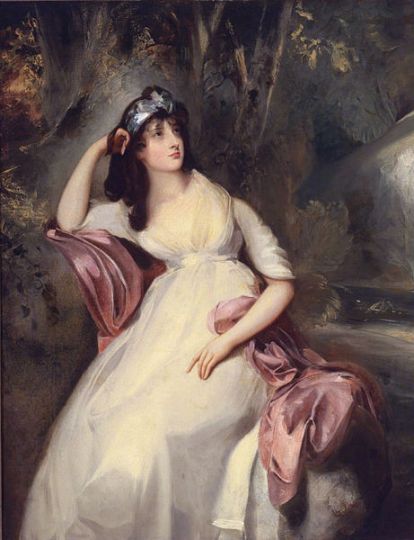The word “hoyden” appears in none of Jane Austen’s writings. But we know one in her novels when we see her.
When Lydia Bennett was discovered to have been living in sin with Mr. Wickham, her uncle Mr. Gardiner wrote the following in a letter back to Longbourn in the most ominous tones:
‘She was sure they should be married some time or other, and it did not much signify when.’ — Pride and Prejudice
To make matters worse, Lydia remained entirely immune to Mr. Darcy’s remonstrations. Her behavior, and the reaction of others, make for some of the best commentary on the real Regency hoyden.
The Wickhams’ living together before marriage was not what inspired the most condemnation. It was the way they, and most particularly Lydia, carried on with complete impunity. She was quite insensible to the notion she ought to be made into an honest woman (a euphemism that ironically denies the true state of affairs–Lydia Bennett is as honest a woman as one might find in the Regency.) And when she is made whole by a wedding brought about by a bribe, she returns to home full of self-satisfaction.
There is plenty of sermonizing. Mr. Collins seems most appalled over Lydia’s lack of humility and remorse. He reserves the worst condemnation for her:
“The death of your daughter would have been a blessing in comparison of this.”
A fitting end to hoydenish behavior.
Austen’s letters reveal still more about the real Regency hoyden. Naughty escapades almost always refer to members of the aristocracy. Her correspondence, like her novels, focus on the fact such characters manage to attend the most exclusive parties even after their debaucheries. Somehow they inveigle invitations to functions as if nothing bad had ever happened.
The notorious Mary-Cassandra Twistleton received special notice in Austen’s 1801 letter to her sister. Amazed that this divorcee should appear in the Upper Rooms at Bath, the author was astonished at how a woman generally acknowledged to have committed adultery might appear unconcerned in company at a select gathering:
“I am very proud to say that I have a very good eye at an Adultress, for tho’ repeatedly assured that another in the same party was the She, I fixed upon the right one from the first.”
In March 1817, she wrote to her niece Fanny, commenting acidly on a recent engagement of a daughter of Lord Paget, divorced from his lady wife some years before:
If I were the Duchess of Richmond, I should be very miserable about my son’s choice. What can be expected from a Paget, from and brought up in the centre of conjugal Infidelity and Divorces?–I will not be interested about Lady Caroline. I abhor all the race of Pagets.
Divorce was not at issue–it was the temerity of the daughter to wed publicly.
Hoydenish, for certain.


Sorry, but divorce was the issue. Well the adultery that led to the divorce. Lord Paget and his wife were divorced n Scotland in a suit brought by Lady Paget , an innocent party. Lady Paget married a duke/
The problem was also that Lord Paget’s sister and at least one of his brothers were also caught up n afairs and divorces. I might be wrong but I think 3 members of the Paget family were involved n scandals concerning adultery.
LikeLike
see my reply below–somehow it got implanted out of order. Thanks for stopping by, Nancy!
LikeLike
Hoyden . . . what a remarkable word. I know, I know I’m going to get beat up for my beliefs about the Regency era. Yet it always saddens me when I read just how misogynistic both men and women were during this time. A woman could only be sexual when she was married, yet men could be sexual whenever they were, ahem, up for it. (Sorry, the pun just slipped out.) What upsets me about Lydia’s story is how young she was–statutory rape age–which I know was an acceptable age for marriage back then and not that long ago too, but it still bothers me.
Austen’s snotty comments about divorcees, only women of course, and other comments about hoyden girls/women have always made it hard for me to stomach her. Especially when viewing her own behavior when she was young, regarding a certain young man that she ran away with. I’ve often wondered if, to quote the Great, “She doth protest too much.” Are Austen’s comments about hoydens, and the snarky comments about female divorcees, her hair-shirt for her own misbehaviors of her past?
All right, I’ll step down from my soapbox now, and curl in a defensive ball to get the beating of my lifetime for my opinions.
LikeLike
Austen didn’t run away with any one and had a most proper and unexiciting life , for the most part. Her wickedness was all in her pen.
LikeLike
Lani, you might be referring to Fanny, Austen’s distant cousin who had a “sexual indiscretion with her husband-to-be,” a circumstance that never happened to any of her heroines. Her letter, commenting on the aftermath, seems to find a silver lining in the fact that she has been relieved of the necessity of writing a “congratulatory letter.” In the eyes of Austen (and her contemporaries of her social class) her relative has been made decent by marriage and there is the satisfaction of knowing one is excused from the usual nuptial celebrations (the schadenfreude.)
LikeLike
“Well the adultery that led to the divorce” — I sense you’re as conflicted as the correspondent. What is really bothering Austen? Licentiousness was an aristocratic sport. To the onlookers, the trade and gentry classes, the way such behavior was carried on openly, without apology, was the crux of the matter. In their view (this includes Austen) the schadenfreude element is missing (“we’ve been robbed!). The offender is supposed to retire to a remote farmhouse in Yorkshire.
LikeLike
Let me try to leave another comment. Don’t know what’s wrong with my computer.
I did love this post. It’s very insightful. And I can’t help but be sad. The open mysogeny is what breaks my heart. Women could only be sexual if married, and only a socially acceptable marriage at that, while men could be sexual whenever they wanted.
I know, I know I won’t be popular for saying this, but one reason why it’s hard for me to stomach Austen is her snarky little comments, that, yes, I know we’re socially acceptable. And the one thing I can’t help but wonder is Austen’s own behavior when she was young. She had a little scandal of her own, which makes me wonder, doth she protest too much?
Just never enjoyed gossip, even if it is a couple hundred years old. Now I’ll step down from my soapbox and curl in a defensive ball for spaeking against Austen.
LikeLike
Goodness speak against Austen, if you wish. She was no plaster saint. However, to what scandal do you refer ? The one in Austen’s life, I mean.
Now I love 200 year old gossip as it gives us insight into places and people of the past. Indeed, much of what we say we know about peole of the past comes to us in gossip, diaries, letters. Of course the people didn’t know they were writing for the ages. Not every ne approved of men having sex all over the place. It was more demeaning to women than the restriction for women to have sex within marriage. Throughout history, having sex only within marriage has been safest for women. One only has to read the news today to see that such a limitation still exists in many places.
LikeLike
I agree with Nancy that Austen’s writings provide an invaluable window into a period of great social change taking place in one of the few stable nation-states in the world at that time.
I do think Austen was writing from strong convictions in her private and public writings–particularly with regard to hoydenish behavior on the part of men and women. Her disapproval primarily rests with the aristocracy, having the means to flout the rules and escape the consequences.
And then there is her novel Emma, where the heroine makes the mistake of supposing her friend Harriet is the byblow of “a gentleman” and it turns out her father is a mere tradesman. The man was wealthy and “decent enough to have always wished for concealment.” He meets with Austen’s approval because he has not openly flaunted his indiscretion.
LikeLike
Fascinating. I’d never heard that Jane Austen was party to any scandal, and I must admit skepticism. But as an interesting commentary on her book, and looking at Lydia’s behavior without the grace of Austen’s prose, I thought the blog was fascinating!
LikeLike
Austen’s writing is quite subtle–her choice of words is very careful and convey volumes. That’s why Lydia’s response to the demands she should marry Wickham are indeed like a thunderclap. Thanks for stopping by, Beppie.
LikeLike
I don’t blame Austen for buying into the beliefs of the time. I’m probably very old fashioned, but I relate to many of her views. And she was certainly ahead of her time is so many other ways. Great post!
LikeLike
Austen was from a lower level of the gentry class. Her father was a rector. She never married and lived at home all her life. It would be difficult for her to stray from the values this home life imposed on her. Which makes her perceptive observation of human personality even more astonishing.
LikeLike
Very enlightening discussion. I don’t know a great deal about Austen’s life, but I find her comments in her letters awfully judgmental. Maybe that was the accepted attitude in her time, but it’s distasteful now.
LikeLike
Oh I don’t know. I think people are just as judgmental now. It’s just that they’re judgmental about different things, like smoking or diet. Haven’t you ever heard anyone say something like, “She’s got lung cancer? Well, she smoked, didn’t she.” or “He had a heart attack? He’s so overweight it’s hardly a surprise.”
LikeLike
I agree with Lil that people are very critical nowadays and not always for the right reasons. But Texas druids brings up a very good point–judging others’ behavior from a values/morals standpoint was acceptable in those days–not as common today, I don’t think.
LikeLike
Hoyden, a delightful description for a unlikely lady, a tomboy, a high-spirited, boisterous, or saucy girl. I have not heard it used today, but it is apt. Perhaps precocious would apply today, but not for a tomboy. I enjoyed this blog. It always surprises me to find that the interfacing btw the opposite sex is unchanging. Perhaps the world and country cultures present outward differences, but the intimacy remain pervasive.
LikeLike
Hoyden has so many meanings today. The idea that a man might like a girl with spirit really came about during the Romantic period. As the nineteenth century wore on, she became increasingly a favored heroine in novels, although there was a good deal of argument over whether this quality was really what men liked.
To go back to my first post in this series and Gone with the Wind: Scarlett tried to convince Mammy, the only character with a true handle on things at Tara, that “gentlemen like to see a girl with a healthy appetite.” Mammy’s response is so true–what folks think and what they say are two different things.
LikeLike
Great blog, Angelyn!
LikeLike
Many thanks, Vicky–
LikeLike
Pingback: What about some of Jane’s less-than-kind comments in her letters? | Austen's Guide to Happiness